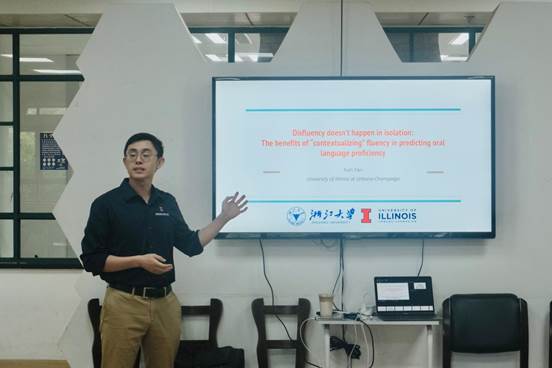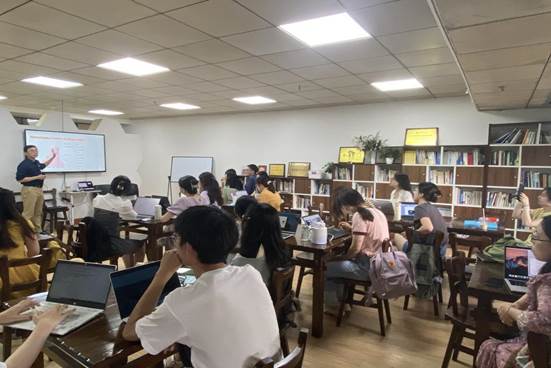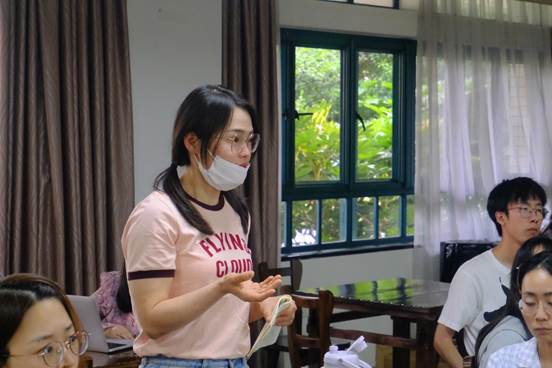On the afternoon of June 14, Associate Professor YAN Xun from the University of Illinois at Urbana-Champaign (UIUC), was invited to give a lecture entitled “Disfluency doesn’t happen in isolation: The benefits of ‘contextualizing’ fluency in predicting oral language proficiency” at the café of East 5 Building of the School of International Studies. The lecture was moderated by Professor MIN Shangchao, Vice Dean of School of International Studies.

Mr. YAN is highly esteemed in the academic community not only as an associate professor in Linguistics, Second Language Acquisition & Teacher Education, and Educational Psychology at UIUC, but also as a faculty member of the Beckman Institute for Advanced Science and Technology. His research findings have been published in top journals such as Language Testing, TESOL Quarterly, Assessing Writing, System, and Journal of Second Language Writing. Additionally, he is a co-editor of the Brief Research Reports Section in TESOL Quarterly.
At the beginning, Professor Yan vividly demonstrated the limitations of evaluating candidates’ oral fluency solely based on the number of pauses, and introduced the topic of “speech disfluency”. Professor YAN shared three recent research studies conducted by his team, gradually delving deeper into the topic.

Firstly, Professor YAN introduced a meta-analysis conducted by his team. Their research findings indicated that the four indicators of fluency measurement, namely speed, amount and duration, breakdown, and repair, show an increasing correlation with language proficiency. This correlation is hardly affected by tasks, candidate groups, and learning situations. He also asserted that the speed remains relatively stable for any individual candidate, while the ways of interruption and repair vary from person to person. He also briefly outlined prospects for future studies.
Then, he shared the process of their team’s analysis through clustering labeled data in their self-built IELTS spoken language corpus. They summarized four common characteristics of speech disfluency from a more micro perspective: (1) short and fluent speech, (2) moderately long speech with frequent filled pauses and some repetitions, (3) moderately long speech with frequent silent pauses and some repetitions, and (4) long speech that lacks fluency. Professor YAN emphasized that a person’s oral proficiency is mainly reflected in his\her ability to deliver short and fluent speeches.
After that, he proceeded to the third study, which explores the “disfluency patterns and profiles” exhibited by candidates with diverse oral proficiency in various speech task categories from a macro perspective. He said that there might be clustering effects in the disfluency characteristics of candidates’ speech, and different candidates may exhibit different disfluency patterns and profiles. Moreover, he emphasized that different disfluency characteristics are important manifestations of oral proficiency.

During the Q&A session, the students and teachers engaged in in-depth discussions with Professor YAN. They sought advice from Professor YAN regarding confusions encountered during the lecture and the difficulties in their current research. Professor YAN answered each question with expertise and had cordial exchanges with the attendees, sharing research experiences and insights.
Finally, Vice Dean MIN Shangchao summarized and concluded the lecture, expressing gratitude to Professor YAN.
Professor YAN’s informative and insightful academic lecture greatly benefited the attendees by broadening their research perspectives and stimulating their research interests.
Text/Photos: Shen Jili/Wang Yanxin
Institute of Linguistics and Applied Linguistics, Zhejiang University
Research Center for Language Development and Assessment, Zhejiang University
Translated by CHEN Xirong and WU Jing, Proofread by XU Xueying



